
SSC (L.L.)Activity Sheet July 2019 With Answers
ACTIVITY SHEET – July 2019
SSC – English (LL) Marks: 80
SECTION I: LANGUAGE STUDY
Q.1. (A) Do as directed. (Attempt any four) (8 marks)
(1) Complete the words by using correct letters. (2)
(i) ear_h
(ii) sma_t
(iii) atta_k
(iv) plea_e
(i) earth
(ii) smart
(iii) attack
(iv) please
(2) Put the words in alphabetical order. (2)
(i) bundle, firm, salary, across
(ii) shop, speed, suit, soon
Ans:
(i) across, bundle, firm, salary,
(ii) shop, speed, soon, suit
(3) Punctuate the following: (2)
(i) whats the secret of your energy i asked
(ii) lets walk together
Ans:
(i) “What’s the secret of your energy?” I asked.
(ii) Let’s walk together.
(4) Make four words (minimum of 3 letters) using the letters in the word ‘classrooms. (2)
Ans: Class, room, moor, ram
(5) Write the related words as shown in the example. (2)
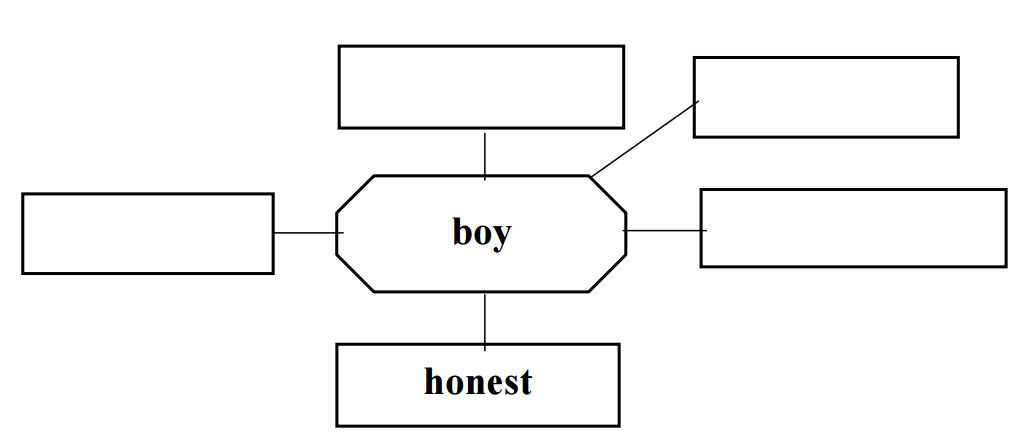
Ans: Clever, small, tall, active
(6) Complete the word-chain of ‘adjectives. Add four words, each beginning with the last letter of the previous word. (2)
cruel, _____, ______, _____, ______
Ans: cruel, (a) large, (b) excellent, (c) tall, (d) lazy.
(B) Do as directed. (2 marks)
(1) (Attempt any one)
(a) Make a meaningful sentence by using the phrase ‘a lot of’. (1) Ans: There were a lot of people at the party.
OR
(b) Add a clause to the following sentence to expand it meaningfully.
You will get success.
Ans: You will get success if you work hard.
(2) (Attempt any one)
(a) Add a prefix or suffix to make new words. (1)
(i) Lucky
(ii) manage
Ans:
(i) Lucky – Unlucky
(ii) manage – management
OR
(b) Make a meaningful sentence using any one of the following words.
(i) lucky
(ii) manage
Ans:
(i) I am lucky that I have a co-operative teacher.
(ii) She had to manage her time wisely to complete all her tasks.
SECTION II: TEXTUAL PASSAGES
Q.2. (A) Read the following passage and do the activities. (10 marks)
A1. State whether the following sentences are true or false: (2)
(i) Dr. Stephen Hawking was born on the eight day of February 1974.
(ii) Dr. Stephen Hawking was a living legend of Biology.
(iii) Courage makes people not lose heart when faced with a great calamity.
(iv) Dr. Stephen Hawking was born before the death of Galileo.
Ans:
(i) Dr. Stephen Hawking was born on the eight day of February 1974. false
(ii) Dr. Stephen Hawking was a living legend of Biology.
false
(iii) Courage makes people not lose heart when faced with a great calamity.
true
(iv) Dr. Stephen Hawking was born before the death of Galileo.
false
|
Exactly 300 years after the death of the great scientist Galileo, Dr Stephen Hawking was born in Oxford, London on the eighth day of January 1942. Little did his parents know that one day their little boy would be hailed as one of the greatest scientists of this century. Neither could anybody imagine that his mind would soar up into space like light. More importantly, none could predict that he would be the very epitome of courage. Courage is a wonderful thing. It is that quality, which makes people not lose heart when faced with a great calamity. It would not be an exaggeration to say that Dr Stephen Hawking, a living legend of Cosmology, is the very personification of courage and hope. Except his mind, his whole body is bound to a wheelchair, thanks to a cruel quirk of fate. Yet, he is one of the greatest scientists of this century. |
A2. Complete the following web: (2)
 Ans:
Ans:
1) bound to ….a wheelchair.
2) born in London
3) one of the greatest scientists of this century.
4) The very personification of courage and hope.
A3. Find the similar meaning word/phrase for the following from the passage: (2)
(i) a period of hundred years century
(ii) a very fine example of something epitome
(iii) acclaimed exaggeration
(iv) unexpected change of destiny quirk of fate
A4 Do as directed. (2)
(1) Courage is a wonderful thing. (Begin the sentence with “ What a……”)
Ans: What a wonderful thing courage is!
(2) He is one of the greatest scientists of this century.
(Choose the correct question tag from the given alternatives)
(a) aren’t he?
(b) is he?
(c) wasn’t he?
(d) isn’t he?
Ans: (d) isn’t he?
A5. ‘Courage is a wonderful thing.’ Do you agree with this statement? Why? (2)
Ans: Yes, I agree with the statement that ‘Courage is a wonderful thing. Because courage is one of the most important values in life .. courage is very important in life because we have to face various problems and peoples in our life which will discourage us and will bring our moral down we should have courage to face such situation and people … so courage is most important value of life.
(B) Read the following passage and complete the activities. (10 marks)
B1. Read the passage and fill in the blanks: (2)
(ii) _____ changed Meena’s life.
(iii) The beggar lived with his______.
(iv) The beggars were playing on the road because _____ there was no traffic.
(v) Meena’s sponsored the granddaughter of the beggar to …………………
Ans:
(i) Meena was a chronic pessimist.
(ii) A beggar changed Meena’s life.
(iii) The beggar lived with his five-year old granddaughter.
(iv) The beggars were playing on the road because … there was no traffic.
(v) Meena’s sponsored the granddaughter of the beggar to attend school and pursue her education.
Top of Form
|
Meena smiled, ‘A beggar changed my life.’ I was absolutely dumbfounded and she could see it. ‘Yes, a beggar,’ she repeated, as if to reassure me. ‘He was old and used to stay in front of my house with his five-year old granddaughter. As you know, I was a chronic pessimist. I used to give my leftovers to this beggar every day. I never spoke to him. Nor did he speak to me. One monsoon day, I looked out of my bedroom window and started cursing the rain. I don’t know why I did that because I wasn’t even getting wet. That day I couldn’t give the beggar and his granddaughter their daily quota of leftovers. They went hungry, I am sure. ‘However, what I saw from my window surprised me. The beggar and the young girl were playing on the road because there was no traffic. They were laughing, clapping and screaming joyously, as if they were in paradise. Hunger and rain did not matter. They were totally drenched and totally happy. I envied their zest for life. |
B2. Complete the following web: (2)
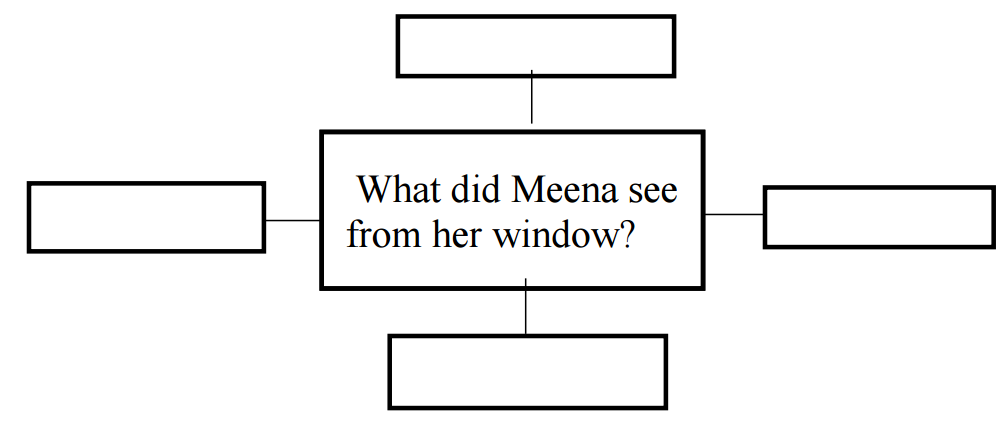
1) The beggar and the young girl were playing on the road because there was no traffic.
2) They were laughing.
3) Clapping
4) screaming joyously, as if they were in paradise.
B3. Find synonyms for the following words from the passage: (2)
(a) heaven _
(b) happily _
(c) rainy _
(d) very surprised _
Ans:
(a) heaven _ paradise
(b) happily _ joyously
(c) rainy _ wet or drizzly
(d) very surprised _ dumbfounded
B4. Do as directed. (2)
(i) They were laughing and screaming.
(Rewrite the sentence using ‘not only….but also’)
Ans: They were not only laughing but also screaming.
(ii) He used to stay in front of my house.
(Rewrite the sentence by using ‘would’)
Ans: He would stay in front of my house.
B5. Personal Response
According to you, how can we help beggars? (2)
Ans: We can give him food and clothes. Some time we can give them money or we can support them to star any business. However, we can try to make them self-reliant.
SECTION III: POETRY
Q. 3. (A) Read the extract and complete the following activities. (5 marks)
A1. Complete the following sentences. (2)
(i) The poet wants to sow many…..
(ii) The whole village goes to the city…
(iii) It becomes dark on its way back…
(iv) When the poet’s father returns home…
Ans:
(i) The poet wants to sow many many, small, small moons of light. (ii) The whole village goes to the city daily to work.
(iii) It becomes dark on its way back as poet’s village is quite far.
(iv) When the poet’s father returns home poet’s son is asleep.
|
O moon, give me moonlight, basketful or two baskets full, with seeds of moonlight. From the city to my village, on the sides of the path I want to sow many, small, small moons of light. The whole village goes to the city daily to work. It becomes dark on its way back as my village is quite far. The route is tough and full of snakes and scorpions. Neither bus nor cart plies. When my father returns home I am asleep. And he goes back early in the morning. while I am sleeping. |
A2. What does the poet wish to get from the moon and why? (2)
Ans: The poet wants to get one or two baskets full of moonlight from the moon.
He wants to sow the seeds of moonlight on both sides of the path in his village.
A3. Write the rhyming words for the following from the extract: (1)
Ans:
(i) any – many
(ii) pity – city
(B) Appreciation of the poem. (5 marks)
Read the following poem and write an appreciation of it using the points given below:
|
A Teenager’s Prayer Each day brings new beginnings, Decisions I must make. I am the only one to choose The road that I will take. I can choose to take the road of life, That leads to great success Or travel down the darkened road, That leads to great distress. Please open up my eyes, dear Lord, That I might clearly see Help me stand for what is right, Bring out the best in me. Help, Lord, to just say “no” When temptation comes my way, That I might keep my body clean And fit for life each day. When my teenage years are over, I know that I will see That life is lived its very best With you walking next to me. – J. Morse |
(1) Title – (½)
(2) Name of the poet – (½)
(3) Rhyme scheme – (1)
(4) Figures of speech (Any 1) – (1)
(5) Theme/Central idea (2)
Ans:
(1) Title – A Teenager’s Prayer
(2) Name of the poet – – J. Morse
(3) Rhyme scheme – abcb
(4) Figures of speech– alliteration, inversion, metaphor
(5) Theme/Central idea
It is a Prayer by Teenager. Teenage is very important age in everyone’s life . The poet tells that the God can show him proper way or the God in the poem is the symbol of the person’s inner mind, family or society, where he learners to differentiate the right or just things with the wrong or worst.
SECTION IV: NON-TEXTUAL PASSAGE
Q.4. (A) Read the passage carefully and complete the activities: (10 Marks)
A1. List the diseases that are caused by houseflies:
Ans: typhoid, Cholera, Dysentery, leprosy, and anthrax.
|
When you think of the most dangerous pests, the housefly probably isn’t one of the first that comes to mind. Instead, you probably think of a pest that stings, like a wasp or bee. It is true that flies rarely bite or sting, but their danger lies in the fact that they often land on dead animals, rotten food, manure and trash. Because they frequent those places, they pick up and spread diseases that are harmful to humans. You get typhoid fever when you eat or drink Salmonella typhi bacteria in contaminated food. Cholera is an intestinal infection, and you get it when you ingest bacteria called Vibrio cholera. Dysentery is one of the more common diseases you might catch from the bacteria spread by a housefly. It gets worse–houseflies can also carry and spread leprosy and anthrax. They even transmit the eggs of parasitic worms! Fortunately, there are several methods you can use to keep houseflies away so you and your loved ones can avoid catching any of the diseases transmitted by the tiny pests. A yard full of animal waste, grass clippings, and other debris will keep you from getting rid of your housefly problem. So, take the time to keep your yards clean. You should cut the lawns. Flies love to hang out around rotting food, so make sure all trash cans are sealed tightly. Make sure all of your food is covered, and if you have fresh produce, keep it in a bag or sealed container. Also, avoid leaving dirty dishes in your sink. The scent of food leftovers could easily attract house flies. |
A2. Complete the following web: (2)

Ans:
1) avoid catching any of the diseases transmitted by the tiny pests.
2) cut the lawns.
3) take the time to keep your yards clean.
4) keep fresh produce in a bag or sealed container
A3. Fill in the blanks using the words/phrases given in the brackets:
(attract, rarely, to keep away, make sure)
(i) We always _____that our house is clean and dry.
(ii) Eat fresh and healthy food ______from any diseases.
(iii) Sweet flowers______ the butterflies.
(iv) Some regions of Maharashtra_____ get enough rain.
Ans:
(i) We always make sure that our house is clean and dry.
(ii) Eat fresh and healthy food to keep from any diseases.
(iii) Sweet flowers attract the butterflies.
(iv) Some regions of Maharashtra rarely get enough rain.
A4. Do as directed. (2)
(i) Rewrite the following sentences and underline the infinitive in it. Take time to keep your yards clean.
Ans: Take time to keep your yards clean.
(ii) Use ‘as well as’ in the following sentence:
Houseflies can carry and spread leprosy.
Ans: Houseflies can carry as well as spread leprosy.
A5. Personal Response: (2)
How do you keep yourself away from any diseases?
Ans: The following things I will do for to keep away from any disease:
1) I will keep my house and its premises clean.
2) I will keep my physics well as family’s neat and clean.
3) Will do regular physical exercise.
4) I will avoid to eat street open stalls food.
(B) Summary Writing (5 marks)
Write a summary of the passage given for comprehension in Q. 4 (A) and suggest a suitable title to it.
Ans:
Housefly the Most Dangerous Pest
It is true that flies rarely bite or sting, but their danger lies in the fact that they often land on dead animals, rotten food, manure and trash. Because they frequent those places, they pick up and spread diseases that are harmful to humans. the diseases that are caused by houseflies are typhoid, Cholera, Dysentery, leprosy and anthrax. One can get rid of houseflies by avoiding catching any of the diseases transmitted by the tiny pests. 2. By cutting the lawns. 3. By taking the time to keep your yards clean. 4. By keeping fresh produce in a bag or sealed container.
SECTION V: WRITING SKILLS
Q. 5. (A) Letter writing: (5 marks)
Al or A2. Do any one of the following:
Imagine that you are Manas/Samiksha Ramrao Jadhav, flat No. 102, Ganesh Nagar, Osmanabad. Write any one of the following letters.
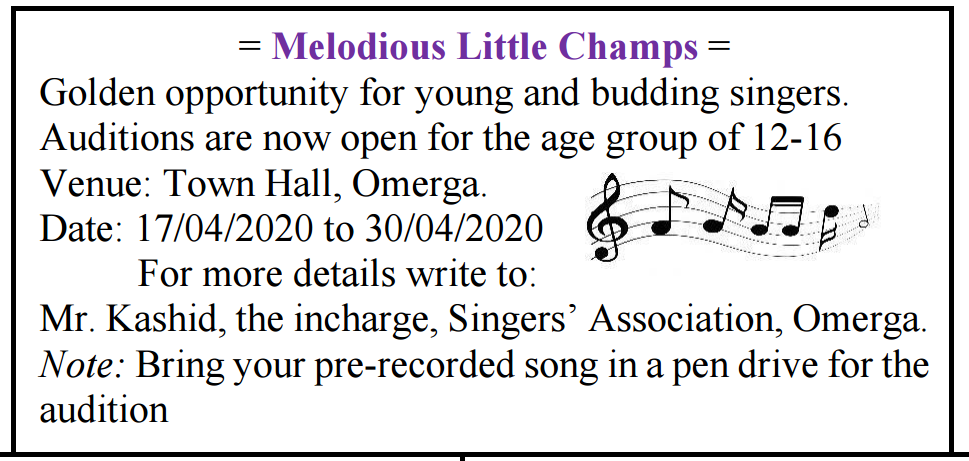
|
A1. Informal Letter |
A2. Formal letter |
|
|
Write a letter to your little brother who is fond of singing. Tell him about the upcoming auditions. Use the points given in the above advertisement. You may add your own points. |
OR |
Write a letter to your school headmaster informing him about the event and requesting to let the students of your school participate in the event. Use the points given in the above advertisement. You may add your own points. |
Ans: A1. Informal Letter
Manas Ramrao Jadhav.
flat No. 102,
Ganesh Nagar,
Osmanabad.
1st April, 2020.
Dear Raj,
I received your letter. I read it. I became very very happy. Don’t worry about me. I am busy in my work.
I am sending this letter for a special purpose. I would like to inform you about the Melodious Little Champs event. I know that you are interested in singing. So, I would like to tell you about Melodious Little Champs event held in Town Hall, Omerga. It is held on 17/04/2020 to 30/04/2020. Auditions are now open for the age group of 12-16. You just bring your pre-recorded song in a pen drive for the audition. It is a good event for the school going students. I think that it is a good opportunity for you. It is a chance to get a platform to show your talent and singing skill before the Maharashtra.
You must participate in this Melodious Little Champs event. Please register your name to the event organiser as early as possible.
Convey my best regards to parents and love to little Chintu.
Yours lovingly,
Manas dada.
B) B1 or B2. Do any one of the following. (5 marks)
B1. Dialogue writing:
(a) Prepare a dialogue from the jumbled sentences. (1)
(i) Yes, I liked to hear when I was a child.
(ii) Did you like to hear bedtime stories when you were a child?
(iii) Because those were very interesting.
(iv) Why did you like them?
(i) Did you like to hear bedtime stories when you were a child?
(ii)Yes, I liked to hear when I was a child.
(iii)Why did you like them?
(iv)Because those were very interesting.
(b) Complete the dialogue. (1)
A: If you do not study well, what will happen?
B: ………………………..
A: If you wake late on a school day, what will happen?
B: …………………………
Ans:
A: If you do not study well, what will happen?
B: I will fail, and will not get success.
A: If you wake late on a school day, what will happen?
B: I will be late for the school ansd class teacher may be angry on me.
(c) Write a dialogue between A and B on the given them. (Minimum 3 meaningful exchanges) (3)
‘Importance of computer Education’.
Ans:
‘Importance of computer Education’
A: Hi Jamia.
B: Hi Sujon.
A: What will you do during the winter vacation, Jamia?
B: I have a plan to learn computer.
A: A very good idea. I should I learn computer too.
B: You are right. Today computer has tremendous necessity. We can’t think to get a job without computer learning.
A: Not only that. Computer is essential to run a business, conduct research work and what not.
B: It is high time we started learning computer. We can do it together.
A: That’s good. Today we can visit NUT, a good centre for learning. B: That’s right. Let’s go.
OR
B2. Drafting a speech:
Imagine that you are the captain of the school. You are asked to deliver a speech on the occasion of sports day. Draft a speech on ‘Sportsmanship’ using the following points. You add your own points.
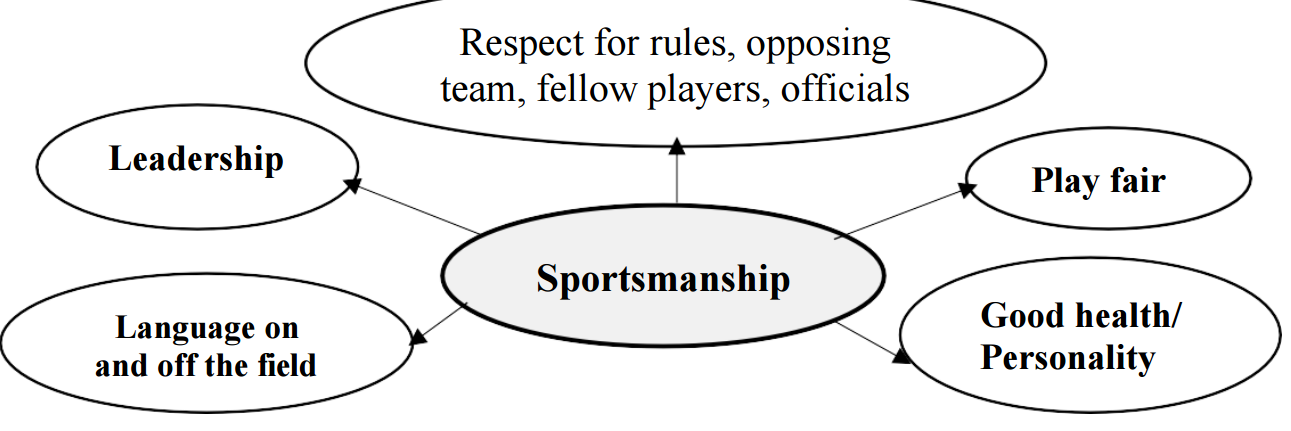
Ans:
|
Sportsmanship Sportsmanship means not only taking part in sports and playing game with the set rules, but also leading a life with the same sportsman spirit displayed on the playing fields. Sportsman spirit is the behaviour and attitude considered as appropriate in sports. A true sportsman follows all that rules in life, which he has been following in the game. A person who has achieved skills and abilities in a game but has not learned to apply the values of the sport in his life cannot be called as a true sportsman. On the other hand, a person who shows a strong sporting spirit in his life but has not achieved much in game is still a sportsman. Usually, those who play games develop into true sportsman because of their nature formed by the training they receive in initial years. Some of the important qualities that a true sportsman displays after defeats are discipline, joyfulness, and admiration for the opponent. Respect, hustle, and loyalty are very important principles for a real sportsman. Sportsmanship is always appreciated by others. Honest and fair-minded play is important in sportsmanship. A side or a team is penalized if its player is found at fault. Similarly, in life one should always be fair in dealing with other people and different situations. |
Q. 6. (A) Information Transfer: (5 marks)
A1 or A2. Do any one of the following:
A1. Non-verbal to verbal
Read the information given in the following tree-diagram and write a paragraph based on it. Give a suitable title to your write up.
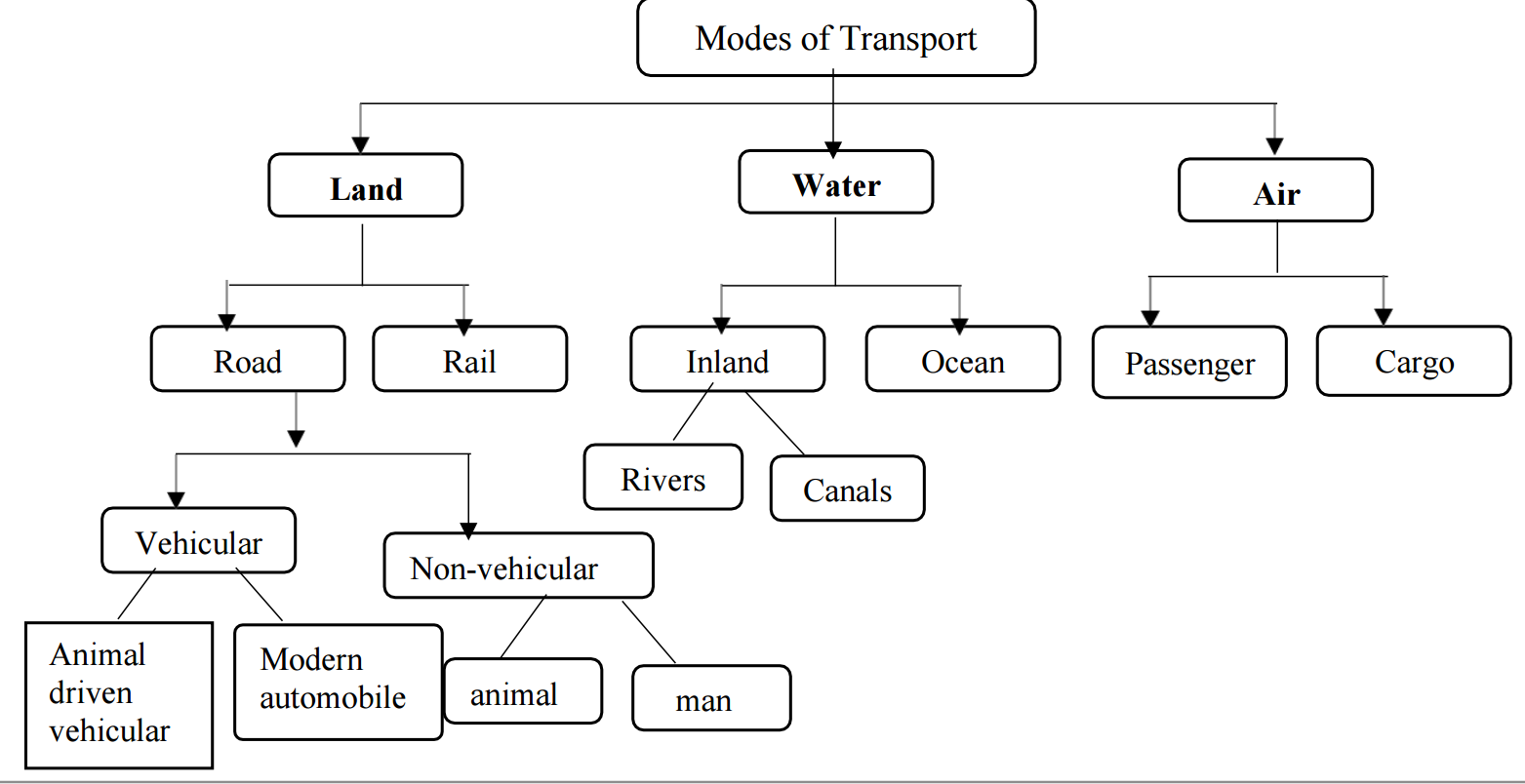
Ans:
Mode of transport
Mode of transport is a term used to distinguish between different ways of transportation or transporting people or goods. The different modes of transport are air, water, and land transport, which includes Rails or railways, road and off-road transport. Other modes also exist, including pipelines, cable transport, and space transport. Human-powered transport and animal-powered transport are sometimes regarded as their own mode, but never fall into the other categories. In general, transportation is used for moving of people, animals, and other goods from one place to another. The means of transport, on the other hand, refers to the vehicles necessary for transport according to the chosen mode (airplane, ship, truck and rail). Each mode of transport has a fundamentally different technological solution, and some require a separate environment. Each mode has its own infrastructure, vehicles, and operations.
Human powered transport, a form of sustainable transportation, is the transport of people and/or goods using human muscle-power, in the form of walking, running and swimming. Modern technology has allowed machines to enhance human power. Human-powered transport remains popular for reasons of cost-saving, leisure, physical exercise, and environmentalism; it is sometimes the only type available, especially in underdeveloped or inaccessible regions.
Although humans are able to walk without infrastructure, the transport can be enhanced through the use of roads, especially when using the human power with vehicles, such as bicycles and inline skates. Human-powered vehicles have also been developed for difficult environments, such as snow and water, by watercraft rowing and skiing; even the air can be entered with human-powered aircraft.
(OR)
A2. Verbal to Non-verbal
Read the following passage about the difference between humans and robots. Put the information about them in a tabular form and give a suitable title to it.
|
Now-a-days robots are made or dressed to look like real humans. So it becomes difficult to differentiate between them, but there are many characteristics that make humans different than robots. A robot is a machine, on the contrary humans are organic individuals. We use ‘it’ pronoun for robot whereas for human ‘he’ or she’ is used. A robot is almost always automatic but humans need aid of external variables. A robot is often electrically powered, humans need food to sustain. Robots can be easily repaired, to be reused but when human body dies, it will no longer come back to life. Humans have highly developed brain with creativity, innovation and emotions. Robots lack own creativity and emotions. Humans are highly social beings, they have their communities and families, robots don’t have any community or family. In spite of these differences humans and robots are complementary to each other. |
Ans:
|
Humans |
Robots |
|
1. organic individuals 2. need aid of external variables 3. food to sustain 4. no longer come back to life 5. creativity, innovation and emotions |
_ a machine _ automatic _ electrically powered. _easily repaired. _ lack own creativity and emotion. |
(B) Expand the theme: (5 marks)
B1 or B2. Do any one of the following:
News report:
Read the following headline and prepare a news report with the help of given points:
Republic Day Celebrations at Mahatma Gandhi Vidyalaya
• Headline
• Dateline
• Introduction
• Short continuing paragraph
Ans:
|
Republic Day Celebrations at Mahatma Gandhi Vidyalaya Mahatma Gandhi Vidyalaya, January26: This year Republic Day was celebrated with great enthusiasm in Mahatma Gandhi Vidyalaya. All the students and teachers gathered on the school ground at 7:30 a.m. The Chief Guest. Ms. Pradhan. Mayor of the city arrived, and everyone cheered. She hoisted the national lag at 8 a.m. Everyone stood to attention and saluted the national lag Then the students sang the national anthem A group of students sang sone patriotic songs. Ms. Pradhan then addressed the gathering. She stressed the need to improve the condition of women in society. She also pointed out several challenging careers open to women. This was followed by tableau showing some events of the freedom struggle. The entire assembly then sang ‘Vande Mataram’. The school dispersed finally after the distribution of sweets. |
OR
B2. Develop a story to get the following end. Suggest a suitable title to it.
|
……….at last, the boy/girl was honored for his/her brave deed by the police department. |
Ans:
|
Brave Girl Yogita was a quiet 10-year-old girl studying in Standard V. She had no friends and she always confined herself to her books. Although Yogita felt lonely, she did not complain to anyone. All her classmates were the children of rich people while she was the son of a fireman. She spent her time studying hard so that she could get good marks in the exams. One day, suddenly, there was a short circuit in one of the classrooms. This soon triggered a fire in the campus. All of them panicked and ran out of their classrooms. However, there was a little girl Rohini who was lame in one leg and could not move out as fast as others. No one turned to help her get out. It so happened that this girl used to occasionally smile at Yogita and she smiled back. So, Yogita immediately noticed that Rohini was not around. Without thinking for a minute, she ran to Rohini’s class and carried her out even as the flames were approaching them very fast. Although she suffered a few minor burns, Yogita was very happy that Rohini escaped unscathed. When the school received a circular from the Education Minister asking for nominations of students who showed an act of bravery, the principal did not have to think twice. And so, on Republic Day, with tears of joy and pride, Yogita was honored for her brave deed by the police department as well as received the National Bravery Award from the Prime Minister. |
SECTION VI: SKILL DEVELOPMENT
Q. 7 Translation: (5 marks)
(a) Translate the following words into your medium of instruction. (Any 4) (2)
(1) Breakfast
(2) delete
(3) Parents
(4) discussion
(5) Education
(6) aspiration
Ans:
(1) Breakfast – न्याहरी
(2) delete – हटवा
(3) Parents – पालक
(4) discussion – चर्चा
(5) Education – शिक्षण
(6) aspiration – आकांक्षा
(b) Translate the following sentences into your medium of instruction. (Any 2) (2)
(1) Vegetables are good for health.
Ans: भाज्या आरोग्यासाठी चाांगल्या असतात.
(2) I like nature.
(3) Trees are our best friends.
Ans: झाडे आमचे शिवलग शमत्र आहेत.
(4) Success in life depends on good health.
Ans: जीवनातील यश हे चांगल्या आरोग्यावर अवलंबून असते.
(c) Translate the following idiom / proverb into your medium of instruction. (Any 1) (1)
(1) Tit for tat .
Ans: जशास तसे
(2) Slow and steady wins the race.
Ans: सावकाश पण शनशित काम करावे


Very nice